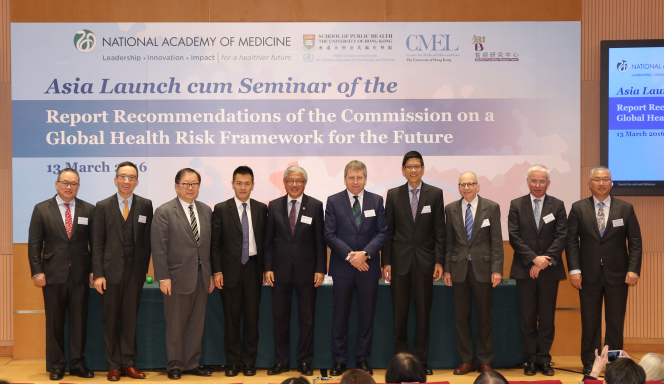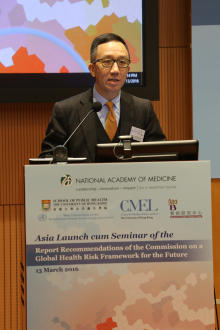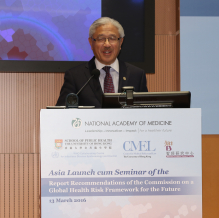Media
Asia Launch cum Seminar of the Report Recommendations of the
Commission on a Global Health Risk Framework for the Future
— Global Collaborations to Prevent and Combat Infectious Diseases
13 Mar 2016

(From left) Mr Terry Kaan, Director of Centre for Medical Ethics and Law, HKU, Professor Gabriel Leung, Dean of Li Ka Shing Faculty of Medicine, HKU, Dr Donald Li, Chairman of Bauhinia Foundation Research Centre, Mr Lau Ming-wai, Commission Funder and Vice Chairman of Bauhinia Foundation Research Centre, Dr Victor Dzau, President of the U.S. National Academy of Medicine, Professor Peter Mathieson, President and Vice-Chancellor of HKU, Professor Tan Chorh Chuan, President of National University of Singapore, Professor Lawrence Gostin, Director of WHO Collaborating Centre on Public Health Law and Human Rights, Mr Peter Sands, Former Group CEO of Standard Chartered PLC and Professor Michael Hor, Dean of the Faculty of Law, HKU took a group photo at the Asia Launch cum Seminar of the Report Recommendations of the Commission on a Global Health Risk Framework for the Future.
In order to cope with the risk of major outbreak of infectious diseases around the globe, the Commission on a Global Health Risk Framework for the Future of the U.S. National Academy of Medicine released a report and recommended an investment of $4.5 billion per year to strengthen national public health systems, improve global response coordination and capabilities, and accelerate R&D. Professor Gabriel Leung, Commissioner and Dean of Li Ka Shing Faculty of Medicine, The University of Hong Kong (HKU), said, “Hong Kong and neighbouring Asian countries have experienced epidemics of infectious diseases, such as SARS, H1N1, H3N2, H7N9, etc. With the recent outbreak of seasonal influenza, both public and private medical services were overwhelmed due to the excessive demand for medical care, revealing deficiencies in global defenses against potential pandemics. It is most timely that we can have an in-depth discussion at this important occasion and offer recommendations to combat infectious diseases.”
In collaboration with the Centre for Medical Ethics and Law of HKU, the U.S. National Academy of Medicine and Bauhinia Foundation Research Centre, the WHO Collaborating Centre for Infectious Disease Epidemiology and Control at the School of Public Health, Li Ka Shing Faculty of Medicine of HKU hosted the Asia Launch cum Seminar of the Report Recommendations of the Commission on a Global Health Risk Framework for the Future at HKU today (March 13, 2016) and presented the report in Asia for the first time.
Three-pronged framework to counter infectious disease crises
Chair of the Commission, Mr Peter Sands, gave an overview of the report recommendations and highlighted that pandemic prevention and response are essential to both national security and global economic stability – not just a matter of health. He also remarked the following: “Using a three-pronged framework to counter infectious disease crises, the Commission recommended that national health systems should be upgraded to achieve stronger national public health capabilities, infrastructure and transparent processes in compliance with international legal obligations under the International Health Regulations; a dedicated Centre for Health Emergency Preparedness and Response should be established by WHO to lead and coordinate pandemic preparedness and response; and an accelerated programme of R&D in a wide range of medical products controlling infectious diseases should be implemented in 2016.”
Investment of US$4.5 billion per year to enhance prevention, detection, and preparedness
“For far too long, infectious disease has been the neglected dimension of global security. Few threats pose such risks to human life and well-being. Yet we have invested relatively little to counter such risks. The Commission believes the time has come to reverse this neglect,” Professor Tan Chorh Chuan, Member of the International Oversight Group of the Commission and President of National University of Singapore, remarked. “The Commission recommended an investment of approximately US$4.5 billion per year – which equates to 65 cents per person – to enhance prevention, detection, and preparedness,” Professor Tan added.
Commission on a Global Health Risk Framework for the Future
Dr Victor Dzau, President of the U.S. National Academy of Medicine, elucidated on the background of the Commission’s report and expressed gratitude to delegates of governments and academia from other countries in the Asia Pacific region such as India, Indonesia, Korea, Malaysia and Singapore on participating in this important meeting of global and regional public health significance. Set up by the U.S. National Academy of Medicine in 2015 following the large-scale outbreaks of SARS, H1N1, Ebola, MERS-CoV and other emerging infectious diseases, the independent Commission on a Global Health Risk Framework for the Future comprises 17 members from different countries and experts in finance, governance, R&D, health systems, and social sciences. The object of the Commission is to make recommendations for an effective global architecture for recognising and mitigating the threat of epidemic infectious diseases, the process of which has been informed by 11 public workshops held in Africa, Asia, Europe and North America, as well as the solicitation of inputs from over 250 experts and stakeholders worldwide. As part of the global dissemination series, the presentation of the report to the World Bank and IMF Spring Meetings and G20 Hangzhou Summit later this year will be considered.
Speakers and guests of Asia Launch and Seminar
The seminar featured a prestigious line-up of speakers comprising Dr Victor Dzau, Chair of International Oversight Group of the Commission, President of the U.S. National Academy of Medicine and recipient of Doctor of Science honoris causa of the 195th Congregation of HKU; Professor Lawrence Gostin, Commissioner and Director of WHO Collaborating Centre on Public Health Law and Human Rights; Mr Peter Sands, Commission Chair and Former Group CEO of Standard Chartered PLC; Professor Tan Chorh Chuan, Member of International Oversight Group of the Commission and President of National University of Singapore; Professor Peter Mathieson, President and Vice-Chancellor of HKU; and Professor Gabriel Leung, Commissioner and Dean, Li Ka Shing Faculty of Medicine of HKU. Many distinguished guests including Professor Sophia Chan, Under Secretary for Food and Health, Dr Constance Chan, Director of Health, Dr Leung Ting-hung, Controller of the Centre for Health Protection had graced the occasion with their presence.
About the U.S. National Academy of Medicine
The U.S. National Academy of Medicine (NAM), established in 1970 under the name Institute of Medicine (IOM), is an independent organisation of eminent professionals from diverse fields including health and medicine; the natural, social, and behavioral sciences; and beyond. It serves alongside the U.S. National Academy of Sciences and the U.S. National Academy of Engineering as advisers to the nation and the international community. Through its domestic and global initiatives, the NAM works to address critical issues in health, medicine, and related policy and inspire positive action across sectors. The NAM collaborates closely with its peer academies, the IOM, and other divisions within the U.S. National Academies of Sciences, Engineering, and Medicine. In addition to its honorific functions, the NAM administers fellowships, scholarships, and awards; hosts workshops, expert meetings, and symposia; and conducts programmes to enrich the broader work of the academies. The NAM also publishes Perspectives, an expert commentary and discussion paper series.
About the WHO Collaborating Centre for Infectious Disease Epidemiology and Control at the School of Public Health, Li Ka Shing Faculty of Medicine, HKU
The School of Public Health, Li Ka Shing Faculty of Medicine of The University of Hong Kong has been designated as a WHO Collaborating Centre for Infectious Disease Epidemiology and Control with effect from 10 December 2014. The designation of the HKU School of Public Health (HKU SPH) as a WHO CC is the first of such kind at the University. HKU SPH has a long and distinguished history in public health education and high impact research. With world leading research in infectious diseases as well as on non-communicable diseases of both local and global importance, the School has made significant contributions through its research and advocacy to improve the health of populations and individuals, both locally and globally. The School is a leading research and teaching hub in public health on influenza and other emerging viruses, control of infectious and non-communicable diseases, tobacco control, air pollution, psycho-oncology, behavioral sciences, life-course epidemiology, and health economics, health services planning and management. This work has informed international (e.g. the World Health Organisation, Food and Agriculture Organisation of the United Nations), national and local public health policies.
About the Centre for Medical Ethics and Law, HKU
The Centre for Medical Ethics & Law (CMEL) is a joint centre of the Faculty of Law and of the Li Ka Shing Faculty of Medicine, at The University of Hong Kong. Its mission is to develop and drive interdisciplinary research in the rapidly developing field of biomedical law, bioethics and the governance and regulation of biomedical research, and of appropriate regulatory responses to new developments in medical technology such as the implications of precision medicine, regenerative medicine, and translational medicine. It seeks to explore the development of appropriate regulatory and governance responses to the sharing of genomic and personal information data and biomaterial in the context of genomic and human tissue research when these are performed on a global or large scale in cross-jurisdictional international collaborative projects, as well as national and global responses to the threat of emergent global infections, and also appropriate legal, ethical and social responses to the management of the end of life in Hong Kong. The Centre expects to launch its specialist Masters programme in medical law and ethics (LLM in Medical Law & Ethics) through the Faculty of Law in 2017/2018 towards its goal of creating a critical mass of professional expertise and academic scholarship in the field of biomedical law and bioethics for Hong Kong.
About The Bauhinia Foundation Research Centre
The Bauhinia Foundation Research Centre is an independent policy think tank set up in March 2006 to focus on Hong Kong’s long-term competitiveness and socioeconomic well-being. We seek to analyse the key factors and conditions that would contribute to Hong Kong’s overall and long-term development through relevant policy studies and current affairs analyses. Our research interests cover the following areas: (a) Regional macroeconomic development – with special emphasis on economic integration with the Mainland and the competitive edge of the Pearl River Delta; (b) Economic and business environment – the conditions and policies for enhancing Hong Kong`s competitiveness in the long run, with special emphasis on policies and measures to attract business, funds and talents; (c) Social environment – the appropriate social policies, in areas such as environmental protection, education, labour, immigration, transport, medical and health, social welfare, town planning, land use and housing to maintain Hong Kong`s economic success. By bringing together talents from different sectors, the Centre pledges to put forth considered and balanced views on policy issues, as well as rational, visionary and strategic ideas to contribute to the overall and long-term development of Hong Kong.
Please visit the website at http://www.med.hku.hk/v1/news-and-events/press-releases for press photos.
Professor Gabriel Leung, Dean of Li Ka Shing Faculty of Medicine, HKU, points out that there are deficiencies in global defenses against potential pandemics, and the seminar has provided the society an opportunity to have an in-depth discussion and offer recommendations to combat infectious diseases.
Dr Victor Dzau, President of the U.S. National Academy of Medicine, says the Commission on a Global Health Risk Framework for the Future recommends an investment of approximately US$4.5 billion per year – which equates to 65 cents per person – to enhance prevention, detection, and preparedness of infectious diseases.


